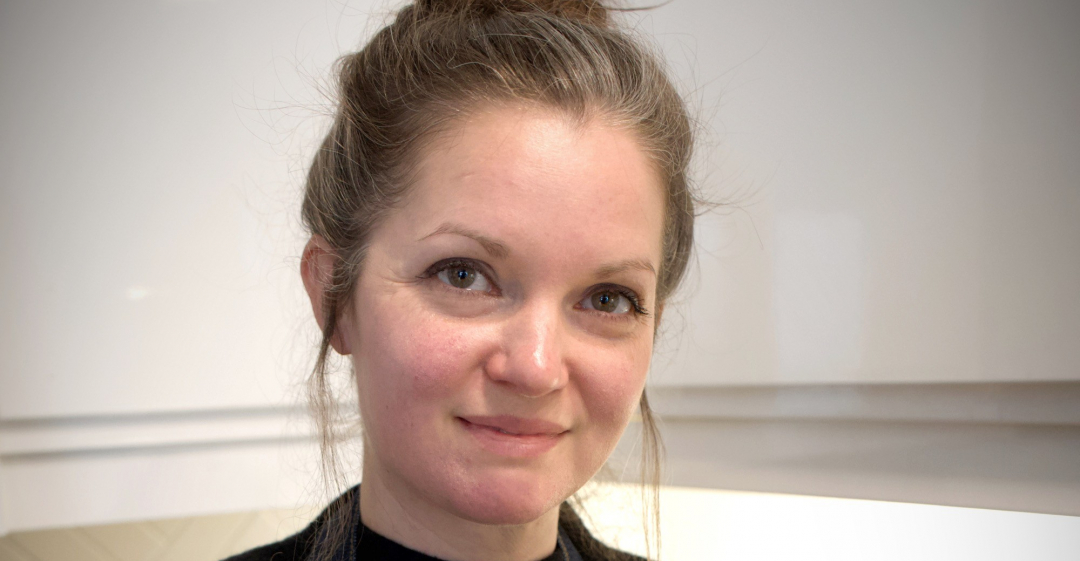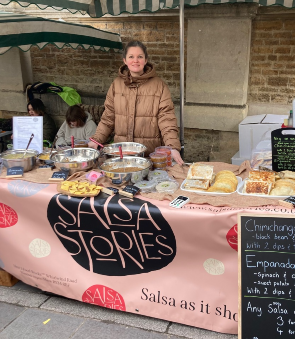“I hadn’t taken any time to question whether this was something I wanted to keep doing, or to reassess my career. ”

What work were you doing previously?
I was a contemporary artist for fifteen years.
For most artists, you have to have other work to pay the bills. I was also an associate lecturer teaching visual culture and related subjects, and I freelanced for different arts organisations.
Often I juggled three jobs at the same time.
What are you doing now?
I run a salsa company, making and selling Texmex-inspired fresh salsa.
Why did you change?
I was finding the experience of being an artist increasingly frustrating.
You accept quite soon into your career that you'll have to do this juggling act with other work, but you can spread yourself so thinly over everything that you do that you can't get ahead in any of it.
While doing these other jobs to support my art practice, the thing I was doing the least was making art.
The time I did have for my art practice was 90% taken up with admin and the business-side of my work, and I was feeling frustrated by that.
When was the moment you decided to make the change?
My dad died in 2019 in a thunderstorm and that was the catalyst that made me decide to change.
But it didn't happen overnight. It took about the course of a year after he died of me thinking about making a change before actually moving forward with a shift.
It really makes you think 'what are you doing with your life' when something like that happens. I think my dad dying was an opportunity to take a look at how my life was going and if I was really happy on that path. And I decided that I wasn't.
I’d got into the rhythm of working at the studio on my art and working my other jobs, and hadn’t taken any time to question whether this was something I wanted to keep doing, or to reassess my career.
I decided that I wasn't going to accept any more freelance work after I'd finished the projects I was working on at the time, and decided I wouldn't accept the next year's teaching fixed-term contract I had with an employer.
I finished up that year of teaching, and this coincided with the first pandemic lockdown.
How did you choose your new career?
Between Christmas and the first pandemic lockdown I'd decided I was going to retrain and do a coding course.
I know it’s a bit leftfield, but I thought it would be really interesting and the tech sector appealed to me. Unlike all my freelance work and fixed-term contracts I’d have the security of a well-paid job in a booming industry.
I applied and got onto a course, did all the prep work, and then lockdown happened. The course kept getting delayed, and it got to the point where it got pushed back until after Christmas of the first pandemic year. So that was shelved for me, and freed up some time.
During the summer I was having a lot of picnics with friends as a way of seeing them while the pandemic lockdown restrictions were eased a bit. I had this amazing recipe for salsa, so I’d make that and bring it to the picnics. Everybody said that the salsa was amazing, but at the time I didn't really think anything of it.
One day we were on our way to go wild swimming and suddenly in the car I thought, ‘salsa, that's what I should do!’. But then almost just as quickly I dismissed it, because I didn't know anything about the food industry.
It felt almost too big of a leap. I didn't know how to go from having a good recipe to having a product on the shelf in the shops.
But the idea didn't go away, and the persistence of it lead me to decide that in the new year I’d look into its feasibility.
And as we got closer to the start of the coding course, I decided that it actually wasn't what I wanted to do, so I shelved it and started pursuing my salsa business idea instead..
Are you happy with the change?
Yes.
I love it more than I loved being an artist so for me it's the best possible result.
What do you miss and what don't you miss?
When people ask me that question and I reflect on it then I do think well yes there are things I miss – the people, making artwork.
But I don't ever really miss them in my day to day – I don't think ‘oh I wish I was making art now’. I'm so in love with what I do right now that I have no time to dwell on thinking about it.
How did you go about making the shift?
Initially I started looking into the salsa idea one day a week, and over a number of weeks I was researching the idea full time.
Then I managed to get a start up loan from Virgin StartUp, and I applied to get a unit in an innovation centre for food startups which I got.
It was only about a six month period from really looking into the idea to launching the product. It was pretty mad now when I look back on it!
For the salsa, I had this amazing recipe as I used to live in the States when I was a kid. My dad stayed in the States while we moved back to the UK, and we'd go back to see him every summer. We'd always go to the same Mexican restaurant, which was like the highlight of the trip. It closed down about ten years ago, and my step-mum told me that they gave all of their regular customers the recipe for their salsa.
So I had this recipe which I used as a flavour map for my three recipes.
For me the salsa idea has this nice tie-in with my dad – it has these memories associated with it, and my dad dying was the catalyst for the change so it felt fitting moving forward with the salsa business.
How did you develop (or transfer) the skills you needed for your new role?
All the skills I needed to have as an artist are now being applied to a business.
When you're an artist it's like you're your own institution as you have to do all the marketing, coming up with project ideas, project management, delivery, budgeting and finance, application writing etc.
Being an artist is quite a good schooling in running a business, so all of those transferable skills are being put to good use now!
What didn’t go well? What wrong turns did you take?
As I didn't know anything about the food industry, it was great that I got the kitchen in the Food Works Southwest when I started as they had all of the expertise.
I could always ask them if I needed help. The kitchen was super high spec – it was a great place to start out. But it had a price tag to match and it was a 45 minute commute from my home.
I’ve got two small kids and it was a logistical nightmare trying to negotiate the journey with drop-offs and pick ups.
Some people might gawp at the expense of the kitchen for a new business, but I absolutely don't regret doing it as having those overheads meant I had to hustle big time to make the business work, whereas if I'd launched it from my home kitchen perhaps it would have taken me a lot longer to get to where I am now because I wouldn't have had the same urgency.
I recently left that kitchen to set up closer to home and I am feeling the benefit of not having that commute!
How did you handle your finances to make your shift possible?
I got a loan from Virgin StartUp and then I had some of my own savings which I invested into the business over time.
I didn’t know at the start how much a business sucks up money. I had to keep investing more and more of my money into it.
But now I’m at a point with the business where I’m paying myself, and it’s a lot more fun when you’re making money!
What was the most difficult thing about changing?
I think in my head beforehand, the idea of giving up the identity of being an artist was difficult.
The reality is I’m not a practicing artist now, but it hasn’t actually been difficult. The idea of giving up the identity was more difficult than the reality of no longer being in that identity.
When you take a big leap like that and you’re leaving behind a community, there’s a worry of ‘well what if this fails massively in front of everyone I know?’. But I think if you worry about things like that, it will hold you back.
One thing I have been finding difficult is that a lot of markets tend to be on the weekends. As I have two small kids, I’m desperately trying to hire people so I can carve some time back for my family. That’s my priority at the moment, taking people on to run market stalls for me.
What have you learnt in the process? 
I've learned so much.
When I first started doing markets, I couldn’t just put my product out on display as it’s a chilled product. So I would have just a couple out in retail packs, with salsa ingredients around them to decorate the stand. At that time I had two flavours and I’d give samples to people.
I then created a third flavour that didn't have packaging ready yet, but I wanted to bring it to the market to get feedback on it. So I'd put it out in a big bowl and I sold so much more because it just looked more inviting having food presented in that way.
So at markets I have everything in bowls now. And I just discovered that by accident. A classic case of trial and error!
What do you wish you'd done differently?
I could have applied for a bigger loan which would have ultimately covered everything.
At the time I didn’t know that I would need as much money as I did – I thought a smaller loan would be enough.
So in hindsight I would have gone for the larger loan, rather than having to use up my savings.
What would you advise others to do in the same situation?
Don’t worry if you don’t know what you want to do.
If you know that something’s not right and you need to make a change, the next thing you usually think is ‘what else can I do?’. That can be such an immediate block as you start thinking ‘well I’m not qualified to do anything else’, or ‘if I want to move into a new sector there’s already a million people in that sector younger than me and more qualified’. Everything can seem impossible.
I think the more you try to figure out what to do, the more difficult it becomes.
Whereas if you give yourself some space to float along and be open to random ideas (like salsa!), you never know what can happen.
And importantly when you do get an idea like that, don’t dismiss it. There’s always a way to make it happen. Even if you know nothing about the new area or idea yet, there are ways to figure out how to do it.
To find out more about Julie’s business, visit www.salsastories.co.uk



